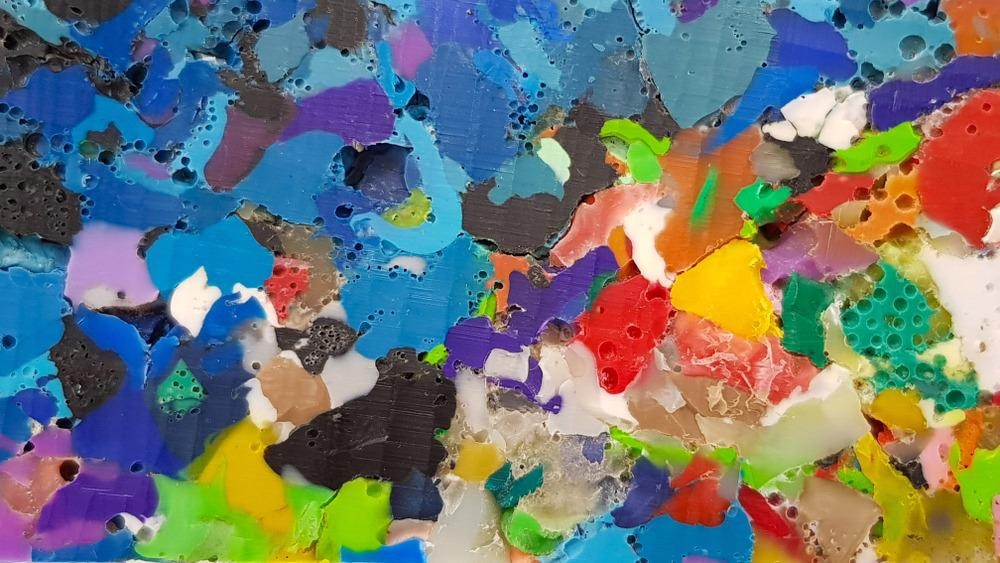 Image Credit: Boling/Shutterstock.com
Image Credit: Boling/Shutterstock.com
Plastic can be found in all corners of the Earth, from the deepest parts of the ocean to the air that we breathe. While large pieces of these polymer-laden materials are a blight on the environment, tiny microplastic particles have penetrated ecosystems, the food chain and even humans.
The ubiquitous material was made to endure – that is why it is so useful, but also why nearly all the plastic ever made still exists. Although we have realized the need to reduce plastic consumption and recycle what we can, it is not always that easy.
There is confusion over exactly which plastics can be recycled, and composite plastics made of different polymers mean only 9% of the 6,300 metric tons of plastic waste generated up to 2015 has been recycled; 79% was discarded in landfills while the rest was incinerated.
Mechanical recycling prepares waste plastics for reuse without altering their chemical structure. Plastic is sorted, cleaned and shredded before being melted and remolded. While an effective way of recycling, the process degrades the quality of plastic over time. Polymer chains within the plastic are partially broken during melting, decreasing its tensile strength and viscosity, making it harder to process.
Chemical Recycling
Chemical recycling is a potentially viable alternative that could work alongside traditional mechanical techniques to improve recycling rates and prevent plastic from reaching landfills. It is a broad term describing a number of emerging technologies in waste management that enable difficult or uneconomical plastics to be reprocessed and reintroduced into the supply chain.
Chemical recycling is an opportunity to recycle the unrecyclable, and it is not fussy whether the plastic is the wrong color or a composite, it is simply fed into an infinite recycling system.
The technology essentially ‘unmakes’ plastics by converting them into their original raw materials, breaking their long hydrocarbon chains into shorter fractions, or single monomers, using chemical, thermal or catalytic processes.
Process; Feedstock Recycling
Thermal conversion or feedstock recycling is a versatile method employing extreme heat to break or crack polymers into simpler molecules. It can be subdivided into pyrolysis and gasification.
Pyrolysis breaks down the plastics in the absence of oxygen to form a vapor which, once cooled, forms an oil-like liquid that can be distilled into different fractions for use in numerous applications. It is suitable for making feedstock for polyethylene and polypropylene production and could plug the processing gap as these plastics cannot be recycled using other methods.
UK-based Recycling Technologies are already turning hard-to-recycle plastic bags and films into Plaxx, a liquid hydrocarbon that can be used to make new, virgin-quality plastics. Plastic Energy intends to expand its European operations to the UK, transforming difficult plastics into confectionary wrappers, pet food pouches and breakfast cereal bags.
Gasification uses limited oxygen to convert plastics into syngas, a mixture of hydrogen, carbon monoxide and carbon dioxide. The process is suitable for all plastics and can be used to produce chemicals, fuel or fertilizer.
Gasification of mixed waste is already a widely used technique, but pyrolysis – which usually happens on a smaller scale – is only just emerging as a commercial reality, with several plants in operation and many more expected.
Process; Depolymerization
Depolymerization or chemolysis converts plastics into monomers identical to those originally used in its creation, and similar in quality. This technique is limited, however, only capable of processing condensation polymers such as PET and polyamides. Addition polymers like polyethylene and polypropylene – which make up the bulk of plastic waste – are unsuitable for depolymerization.
US-based Ineos are among the first to use the technique; they separate the plastics, convert them back into monomers, and then purify and repolymerize them to make high-purity virgin resin. They essentially depolymerize polystyrene into styrene, before polymerizing it back into polystyrene!
Process; Hydrolysis or Hydrothermal Treatment
Supercritical water, heat and pressure are used to convert waste plastics into chemicals and oils by ‘cracking’ the long-chain hydrocarbons into shorter-chain, stable hydrocarbons. It almost boils the plastic – which can be any kind, color or composition – and the vapor is condensed into virgin-equivalent hydrocarbon fragments for reuse.
UK-based Mura Technology is utilizing this technology, which is still in its early stages; their Teeside plant is acting as a pilot plant, with the company aiming to roll out such technology globally.
Conclusion
Chemical recycling is still in its infancy, with little progress made over the years. Its processes are energy-intensive, and there are some technical challenges that need to be overcome, particularly in scaling up the technology. They are also expensive and require significant investment to make them worthwhile – it’s often cheaper to simply make new plastic than it is to recycle!
However, the idea of indefinite or circular recycling will keep plastics in circulation and prevent them from being sent to landfills or incineration. Chemical recycling could tackle the ever-growing problem of plastic waste, particularly when it comes to hard-to-recycle plastic that would otherwise be heading for landfill, and complement current mechanical recycling processes, making a real contribution to solving the plastic crisis.
References and Further Reading
Latham, K. (2021) The world's first 'infinite' plastic, BBC Future Planet: https://www.bbc.com/future/article/20210510-how-to-recycle-any-plastic. Accessed 19th May 2021.
British Plastic Federation, Chemical Recycling 101, BPF: https://www.bpf.co.uk/plastipedia/chemical-recycling-101.aspx. Accessed 19th May 2021.
Trainic, M, et al (2020) Airborne microplastic particles detected in the remote marine atmosphere, Communications Earth & Environment: https://www.nature.com/articles/s43247-020-00061-y: Accessed 19th May 2021.
Geyer, R. et al (2017) Production, use, and fate of all plastics ever made, Science Advances: https://pubmed.ncbi.nlm.nih.gov/28776036/. Accessed 19th May 2021.
Ineos, Recycling, Ineos: https://www.ineos.com/sustainability/circular-economy/recycling/. Accessed 19th May 2021.
Mura Technology: https://muratechnology.com/technology/. Accessed 19th May 2021.
Disclaimer: The views expressed here are those of the author expressed in their private capacity and do not necessarily represent the views of AZoM.com Limited T/A AZoNetwork the owner and operator of this website. This disclaimer forms part of the Terms and conditions of use of this website.